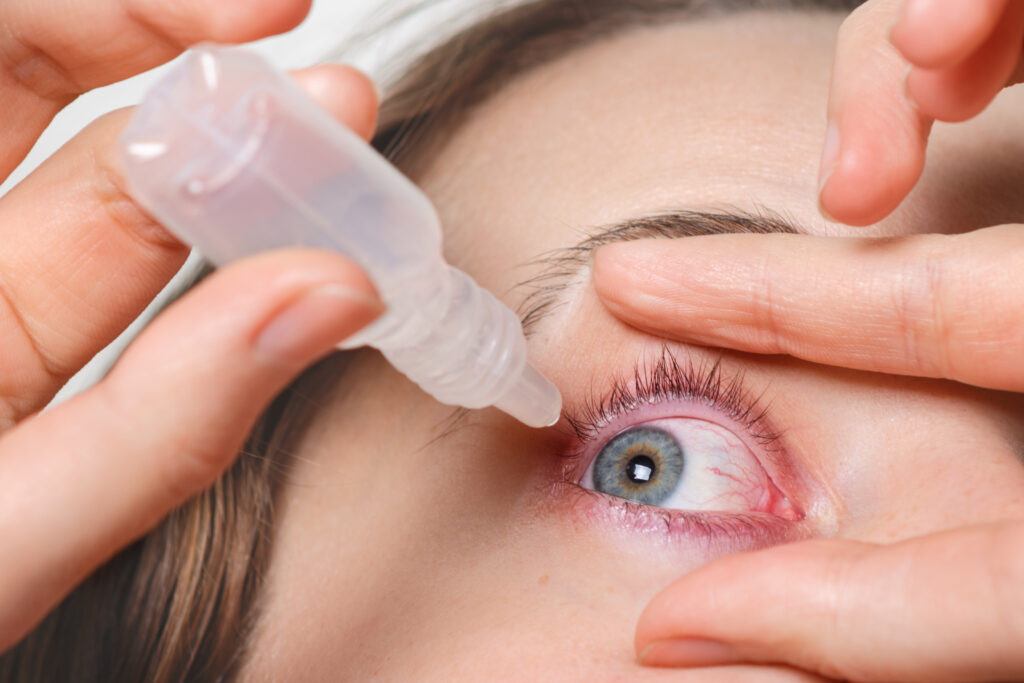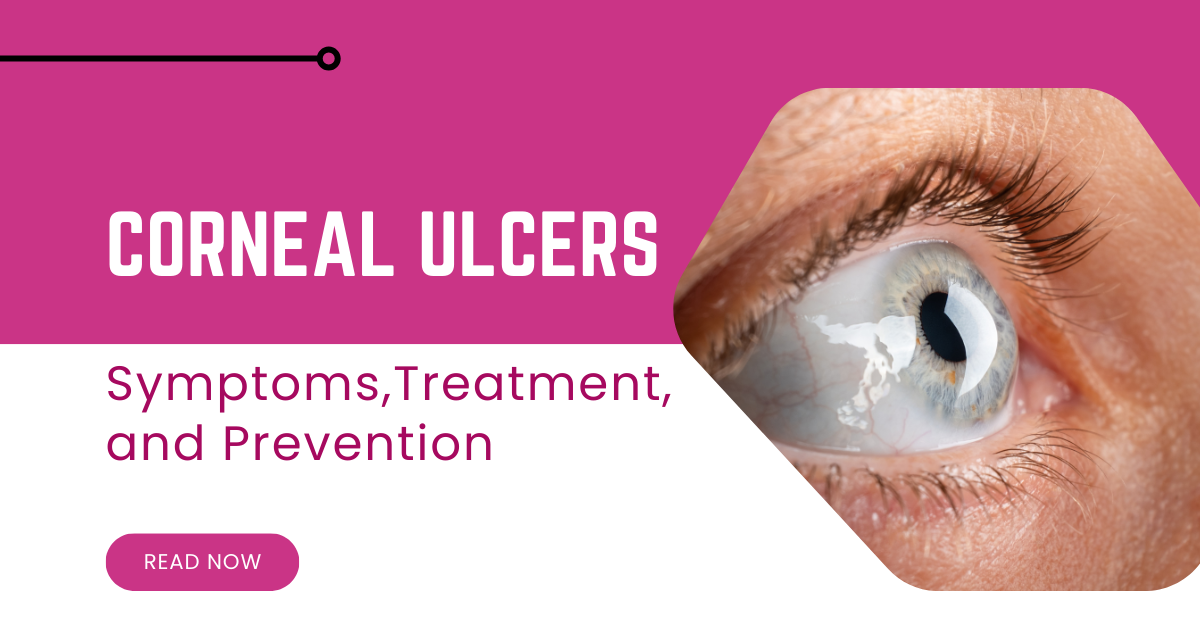Introduction
The human eye is one of the most delicate organs, and any damage to its surface can have serious consequences. One such condition that requires immediate attention is a corneal ulcer. This eye disorder can cause significant discomfort and, if left untreated, may even lead to vision loss.
In this blog, we will explore what corneal ulcers are, their symptoms, causes, treatment options, and preventive measures to help you maintain optimal eye health.
What is a Corneal Ulcer?
A corneal ulcer is an open sore that develops on the cornea, the transparent front layer of the eye. It is usually caused by infections, injuries, or underlying eye conditions. The cornea plays a crucial role in focusing light onto the retina, and any disruption can lead to blurred vision or severe complications.
Key Terms to Understand:
- Cornea: The clear, dome-shaped surface that covers the front of the eye.
- Ulcer: A break or sore in the corneal tissue.
- Keratitis: Inflammation of the cornea, which often precedes an ulcer.
Causes and Symptoms of Corneal Ulcers
Causes:
Corneal ulcers can result from various factors, including:
- Bacterial Infections: Common in contact lens users who do not maintain proper hygiene.
- Viral Infections: Conditions such as herpes simplex or varicella-zoster can lead to corneal ulcers.
- Fungal Infections: Often linked to eye injuries from plant material or prolonged use of contaminated eye drops.
- Parasitic Infections: Acanthamoeba keratitis, associated with poor contact lens hygiene, is a rare but serious cause.
- Eye Trauma: Scratches, burns, or foreign objects in the eye can lead to ulcer formation.
- Underlying Eye Diseases: Conditions like severe dry eye syndrome or autoimmune diseases can make the cornea more susceptible to ulcers.
Symptoms:
Recognizing the early signs of a corneal ulcer can prevent further complications. Symptoms include:
- Severe eye pain and redness
- Excessive tearing and discharge
- Blurry vision
- Sensitivity to light (photophobia)
- Swollen eyelids
- A white or grayish spot on the cornea
Treatment Options for Corneal Ulcers
Corneal ulcers require prompt medical attention to prevent vision impairment. Treatment varies depending on the underlying cause:
1. Medications:
- Antibiotic Eye Drops: For bacterial infections, broad-spectrum antibiotics are prescribed.
- Antiviral Medications: If a viral infection is suspected, antiviral eye drops or oral medications may be necessary.
- Antifungal Eye Drops: Used for fungal-related corneal ulcers.
- Pain Relievers and Anti-inflammatory Drops: These help reduce pain and inflammation.
2. Contact Lens Discontinuation:
If you wear contact lenses, your doctor will likely advise you to stop using them until the ulcer heals completely.
3. Surgical Intervention:
In severe cases, surgery may be required:
- Corneal Debridement: Removal of infected corneal tissue to promote healing.
- Corneal Transplant: If the ulcer causes extensive damage, a corneal transplant may be necessary to restore vision.

Prevention Tips to Protect Your Eyes
Taking preventive measures can significantly reduce the risk of developing corneal ulcers:
1. Maintain Proper Contact Lens Hygiene:
- Always wash your hands before handling contact lenses.
- Use fresh contact lens solution—never reuse old solution.
- Remove lenses before sleeping.
2. Protect Your Eyes from Injury:
- Wear protective eyewear when engaging in sports or hazardous activities.
- Avoid rubbing your eyes if you feel irritation.
3. Seek Immediate Medical Attention for Eye Infections:
- Do not ignore redness, pain, or discomfort in your eyes.
- Visit an ophthalmologist if you suspect an eye infection.
Meet Dr. Smita Mukherjee
Dr. Smita Mukherjee is a senior ophthalmologist with over 30 years of experience. After completing her post-graduation from Seth G.S. Medical College with academic honors, she joined the faculty at the same institution. During her tenure, she examined a vast number of patients, gaining extensive experience in all aspects of ophthalmology.
As a recognized university postgraduate teacher, she has trained multiple batches of postgraduate students. Since 1997, she has been practicing privately from her well-equipped clinics. Currently, she offers consultations at:
Eye Solutions Clinic 401, Pearl Belleza, D. K. Sandu Marg, 19th Road Corner, Chembur, Mumbai 400071.
She specializes in Cataract, Phacoemulsification, Refractive Errors, Diabetic Retinopathy, and Age-Related Macular Degeneration. Patients can book an appointment by visiting her clinic or calling the provided contact number.
Frequently Asked Questions (FAQs)
1. How long does it take for a corneal ulcer to heal?
Healing time varies depending on the severity and treatment. Mild ulcers may heal within a week, while severe cases can take several weeks.
2. Can corneal ulcers cause permanent vision loss?
Yes, if left untreated, corneal ulcers can lead to scarring and vision impairment. Seeking early treatment is crucial.
3. Are corneal ulcers contagious?
Some ulcers caused by infections, such as viral or bacterial keratitis, can be contagious. It is essential to maintain good hygiene.
4. Can I wear contact lenses while treating a corneal ulcer?
No, wearing contact lenses can worsen the condition. You should wait until your ophthalmologist confirms complete healing.
5. What foods help improve eye health?
A diet rich in Vitamin A, omega-3 fatty acids, and antioxidants—such as carrots, fish, and leafy greens—can promote overall eye health.
6. Can I use home remedies for corneal ulcers?
Home remedies are not recommended. Always seek professional medical advice for proper diagnosis and treatment.
7. What should I do if I suspect I have a corneal ulcer?
Immediately consult an ophthalmologist for a comprehensive eye examination and appropriate treatment.
Conclusion
Corneal ulcers are a serious eye condition that requires prompt medical attention. Recognizing the symptoms early and seeking professional help can prevent complications and ensure a speedy recovery.
If you experience any eye discomfort, do not ignore it. Consult an expert like Dr. Smita Mukherjee to receive the best possible care. Protecting your vision starts with awareness and proactive eye care!

